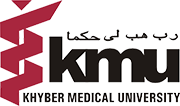KMU 9th Annual Health Research Conference concludes
Only 10% of the world expenditure on health research and development is spent on health conditions that represent 90% of the global disease burden. This vast inequity between drug research and development and neglected diseases reveals a need to bolster the research capacity in developing countries like Pakistan through international and national collaboration. In this respect, the leading and active role of various institutions especially medical universities like Khyber Medical University (KMU) in partnership with international and national organizations is not only appreciable but required to more focus on joint strategies; this was stated by Federal Director General of Health Services Prof. Dr. Asad Hafeez in his speech as chief guest during closing ceremony of 9th annual health research conference 2018.
Prof. Dr. Asad Hafeez said it is the core responsibilities of higher education institutions who are working in health to develop solutions to overcome various challenges, such as lack of financial and intellectual resources, which hamper efforts to build a solid research community. Universities are not only fountains of generating knowledge but more importantly the time is come that they should also lead to action by transforming the knowledge into practice. In particular, research outcomes must guide policy and program development as well as the delivery of health services. Healthcare interventions should be evidence-based and grounded in solid research, he added.
While talking to the ceremony WR WHO Pakistan, Dr. Mohammad Assai said that health research is also important in order to take an interdisciplinary approach to global health problems, which are multi-faceted in nature. Health is a broad concept that is influenced by various social, economic and political determinants, so while talking about health research we should focus on all of its relevant aspects. He urged that research is not only needed to uncover best practices and eliminate barriers to care, it is also needed to measure impact. This is important because unprecedented amounts of resources are invested in public health and healthcare worldwide which needs to be documented properly.
Dr. Assai mentioned that research must focus on concerns raised by developing countries, closing not only the gap in health disparities within countries, but also the gap in knowledge between the developed and developing world. Furthermore, research is needed to establish and collect health metrics which are essential for public health action and form the foundation for policy making, planning, programming, and accountability. As the field of global health research continues to grow, these gaps make it clear that student researchers have the potential to make important contributions.
Besides others Technical Officer WHO-EMRO Prof. Dr. Gohar Wajid, Pro VC KMU Prof. Dr. Jawad Ahmad and Prof. Dr. Arshad Javed were also present at the concluding ceremony, where as summary of the three days conference was presented by Director KMU-ORIC Dr. Zohaib Khan and vote of thanks were offered by Prof. Dr. Zille Huma Director KMU-IBMS. Shields and certificates were also distributed among the winners of oral and poster competitions of the conference.
